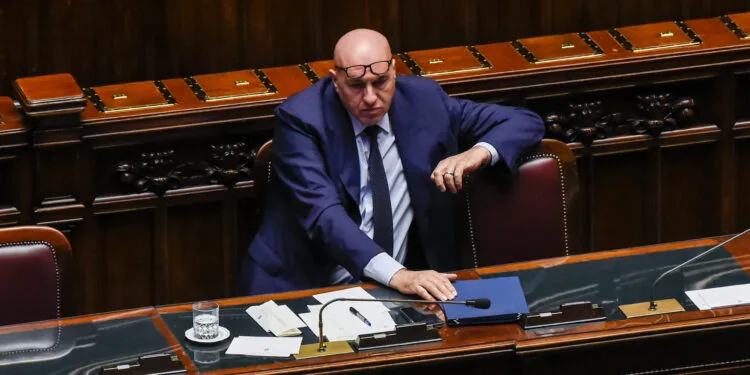Brussels – For Italian Defence Minister Guido Crosetto, it is good that the European Union has begun to take defence more seriously by creating a new dedicated portfolio in the next Commission. On the sidelines of the informal Council in Brussels, the portfolio holder said that strategic issues have become central at this historical stage. However, to centralise spending targets set by Europe and NATO, it is necessary to review EU budget rules, which prevent member states from allocating the necessary resources.
“I have read” that the elected chairwoman of the EU executive Ursula von der Leyen “will be appointing a European commissioner for Defense: this can only please me,” the minister told reporters as he exited the meeting with his counterparts from the Twenty-Seven. Today’s meeting closes the two-day informal meetings—yesterday (Aug. 29), the foreign affairs holders met—known as the Gymnich, marking the resumption of work after the summer break. In a break from the rule, the meetings were held in Brussels instead of Budapest (the capital of the country holding the rotating EU presidency) as a form of sanction to the Hungarian government, whose leader Viktor Orbán has irked the Commission and chancelleries over his nonchalant “diplomatic” tours between Ukraine, Russia, China, and the United States.
Crosetto also hopes “that the Defence Subcommittee will become a permanent committee within the European Parliament as well,” arguing that “if it is so relevant to build the defence of the future for every European country, for the whole of Europe, then we need to adapt and thus give back a space that defence has not had in recent years, especially European defence.” Given the centrality the issue has acquired in this period, the minister reiterated, the bloc must equip itself with appropriate political structures.
Above all, he insisted that the regulatory framework that determines member states’ room for financial manoeuvre must also be adjusted. Crosetto called on the EU to “decide” between budgetary restraint and military spending now that a new five-year institutional cycle begins: “If defence is crucial in this phase we are living through,” he explained, “Europe must decide whether to exclude defence spending” from the Stability and Growth Pact (SGP), the one that lists the constraints the Twenty-Seven must meet (such as debt-to-GDP ratio at 60 per cent and deficit-to-GDP ratio at 3 per cent). In the minister’s words, deciding on the defence budget is not the minister of defence but the minister of economy and finance, who “does not decide based on the security situation in the world, but based on the constraints that come from the European Union.”
Crosetto warned that “If this does not happen, we will not be able to make the commitments that Europe itself wants to make,” pointing out that NATO’s Deputy Secretary General Angus Lapsley “agreed with me.” The same Alliance official, Crosetto continued, “said that the Alliance will no longer be satisfied with 2 percent” of national GDP allocated to military spending, but “we will need 2.5 or 3 percent.” In the Italian case, where currently not even the 2 per cent target set by the Atlantic Alliance can be met, defence will have to be adapted “to the new challenges and the new world,” and to do that, resources are needed that only the Ministry of Economy and Finance can handle, but so far its hands have been tied by Brussels.
English version by the Translation Service of Withub
![L'Alto rappresentante per la politica estera e di sicurezza dell'Ue, Josep Borrell, agita la campanella di inizio lavori. Da parte sua rimproveri per l'Italia [foto: European Council]](https://www.eunews.it/wp-content/uploads/2024/08/borrell-campanella-350x250.jpg.webp)
![Un momento della riunione informale del consiglio Affari esteri [Bruxelles, 29 agosto 2024. Foto: European Council]](https://www.eunews.it/wp-content/uploads/2024/08/borrell-kaag-350x250.jpg.webp)



